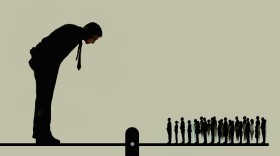
Shankar Vedantam
Shankar Vedantam is the host and creator of Hidden Brain. The Hidden Brain podcast receives more than three million downloads per week. The Hidden Brain radio show is distributed by NPR and featured on nearly 400 public radio stations around the United States.
Vedantam was NPR's social science correspondent between 2011 and 2020, and spent 10 years as a reporter at The Washington Post. From 2007 to 2009, he was also a columnist, and wrote the Department of Human Behavior column for the Post.
Vedantam and Hidden Brain have been recognized with the Edward R Murrow Award, and honors from the American Association for the Advancement of Science, the Society for Personality and Social Psychology, the International Society of Political Psychology, the Society of Professional Journalists, the National Association of Black Journalists, the Austen Riggs Center, the American Psychoanalytic Association, the Webby Awards, the Pennsylvania Associated Press Managing Editors, the South Asian Journalists Association, the Asian American Journalists Association, the Pennsylvania Newspaper Association, the American Public Health Association, the Templeton-Cambridge Fellowship on Science and Religion, and the Rosalynn Carter Mental Health Journalism Fellowship.
In 2009-2010, Vedantam served as a fellow at the Nieman Foundation for Journalism at Harvard University.
Vedantam is the author of the non-fiction book, The Hidden Brain: How our Unconscious Minds Elect Presidents, Control Markets, Wage Wars and Save Our Lives. The book, published in 2010, described how unconscious biases influence people. He is also co-author, with Bill Mesler, of the 2021 book Useful Delusions: The Power and Paradox of the Self-Deceiving Brain.
-
As a society, we talk about sex more openly today than ever before. But so much still goes unsaid. This week on the Hidden Brain radio show, complicated stories of intimacy and attraction.
-
How many ads have you encountered today? On this week's radio show, we discuss the insidiousness of advertising in American media.
-
If you listen closely to giggles, guffaws, and polite chuckles, you can discern a huge amount of information about people and their relationships with each other. This week, we talk with neuroscientist Sophie Scott about the many shades of laughter, from cackles of delight among close friends to the "canned" mirth of TV laugh tracks. You can find more about the research discussed in this episode here: https://n.pr/2RORlDs
-
This week on the Hidden Brain radio show, we dig into the culture and psychology that determines the foods that make us salivate and the scents that make us squirm.
-
When a newspaper shuts down, there are obvious costs to the community it serves: job losses, fewer local stories. But new research suggests there's another consequence that's harder to spot—one that comes with a hefty price tag for residents. This week on Hidden Brain we ask, who bears the cost when nobody wants to pay? For more information about the research in this episode, visit https://n.pr/2zSPraS.
-
More than 70,000 people died of drug overdoses last year — many of them from heroin and other opioids. One of the most widely-used tools to confront this crisis is a drug called naloxone. It can reverse an opioid overdose within seconds, and has been hailed by first responders and public health researchers. But earlier this year, two economists released a study that suggested naloxone might be leading some users to engage in riskier behavior — and causing more deaths than it saves. This week, we talk with researchers, drug users, and families about the mental calculus of opioid use, and why there's still so much we're struggling to understand about addiction. For more information about the research in this episode, visit https://n.pr/2OZfuGQ.
-
There is one truth that has endured through the first two years of Donald Trump's presidency: he has kept the support of the core voters who propelled him to the White House. This week on Hidden Brain, we explore two competing perspectives on the motivations of Trump supporters, and what they can tell us about the state of our union.
-
If you live in a big city, you may have noticed new buildings popping up — a high-rise here, a skyscraper there. The concrete jungles that we've built over the past century have allowed millions of us to live in close proximity, and modern economies to flourish. But what have we given up by moving away from the forest environments in which humans first evolved? This week, we discuss this topic with psychologist Ming Kuo, who has studied the effects of nature for more than 30 years.
-
Decades ago, a group of women accused a prominent playwright of sexual misconduct. For the most part, the complaints went nowhere. In 2017, more women came forward. This time, people listened.
-
This week on Hidden Brain's radio show, we tackle a big topic: power. From our conflicted feelings toward the powerful, to the ways we gain and lose power ourselves, and how power can corrupt.









